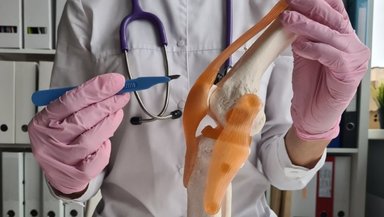Revision vs Replacement: Which Option Is Best When a Hip or Knee Fails

Medicine Made Simple Summary
When a hip or knee replacement fails, patients and families are faced with a difficult question: should they undergo a revision surgery to repair or adjust the implant, or should the implant be replaced entirely with a new one? The choice depends on many factors including age, implant condition, bone quality, and overall health. This article explains the difference between revision and replacement surgeries, explores their pros and cons, and offers real patient perspectives to help you make an informed decision.
Introduction: Why This Decision Matters
Hip and knee replacements have transformed millions of lives by reducing pain and improving mobility. But like all medical procedures, they are not perfect. While most implants last 15–20 years or longer, some fail earlier due to wear, loosening, infection, or other complications. When this happens, surgeons may recommend either revision surgery or a full replacement of the implant. Choosing the right option is crucial for long-term outcomes, recovery time, and patient satisfaction. This article will break down the differences, risks, benefits, and real-world considerations that go into this decision.
Understanding Revision Surgery
Revision surgery refers to a procedure where the surgeon repairs, adjusts, or partially replaces parts of an existing implant. For example, if only one component of the knee joint (like the tibial plate) is worn out, it may be replaced while the rest of the implant is kept intact. Revision surgery can also involve tightening loose parts, cleaning out infected tissue, or adding bone grafts to strengthen weak areas. It is generally less invasive than a full replacement but can still be complex, depending on the underlying problem.
Understanding Full Replacement Surgery
A full replacement, on the other hand, involves removing the existing implant entirely and fitting a new one. This is often necessary if the implant is severely damaged, incorrectly positioned, or if infection has spread deeply into the joint. Full replacement surgeries tend to be more invasive, require longer recovery, and sometimes involve more advanced implants such as custom or cemented options. However, they provide a fresh start when partial fixes are not enough.
When Is Revision Surgery the Better Option?
Revision surgery may be recommended when:
- Only part of the implant is worn out.
- The joint is otherwise stable.
- The patient is younger and conserving bone is important.
- Infection is mild and limited to certain areas.
- The patient’s overall health makes a less invasive procedure safer.
Revision surgery allows surgeons to preserve as much of the original implant and surrounding bone as possible, which can be especially beneficial for long-term outcomes.
When Is Full Replacement the Better Option?
Full replacement is often chosen when:
- The implant is severely worn out or broken.
- There is major bone loss or implant loosening.
- The joint is unstable and cannot be fixed with minor adjustments.
- There is deep infection that requires removal of all hardware.
- Previous revisions have already failed.
In such cases, a new implant provides the best chance of restoring stability and function, even if the recovery process is longer.
Key Factors That Influence the Decision
Surgeons evaluate several factors before recommending revision or replacement:
1. Patient Age: Younger patients may benefit from revision to preserve bone, while older patients may do better with a new implant.
2. Bone Quality: Weak or fractured bones may require a sturdier replacement implant.
3. Type of Failure: Loosening, infection, or wear all affect the surgical choice.
4. General Health: Patients with diabetes, heart disease, or other conditions may not tolerate long surgeries well.
5. Patient Lifestyle: Active individuals may need a more durable solution, while less active patients may prefer simpler revision.
This decision is highly individualized and requires detailed consultation with an orthopedic surgeon.
Pros and Cons of Revision Surgery
Pros:
- Less invasive in some cases.
- Preserves more bone.
- Shorter recovery compared to full replacement.
- Lower risk of complications in selected patients
Cons:
- May not fully solve the problem if damage is widespread.
- Risk of future failure and need for another surgery.
- Complex surgical techniques required.
Pros and Cons of Full Replacement
Pros:
- Provides a fresh start with a completely new implant.
- Better long-term stability for severely damaged joints.
- Removes sources of deep infection.
- Often improves pain and function dramatically when successful.
Cons:
- More invasive with longer recovery.
- Higher blood loss and surgical risks.
- Risk of complications like fractures or nerve damage.
- Not always the best choice for medically fragile patients.
Patient Perspectives: Real Stories
Patients often share their experiences online. One patient described how a partial revision solved her instability issues and allowed her to avoid a larger surgery. Another shared how repeated revisions eventually failed, and a full replacement finally gave lasting relief. These stories highlight the importance of individualized decisions and the value of second opinions before committing to surgery.
The Role of Imaging and Diagnostics
Surgeons rely on X-rays, CT scans, MRIs, and blood tests to decide whether revision or replacement is best. These tests reveal the extent of implant wear, bone loss, infection, and alignment problems. Advanced imaging ensures that the surgical plan is tailored to the patient’s exact needs, reducing the risk of poor outcomes.
The Indian Context: Cost and Availability
In India, cost is often a deciding factor. Revision surgeries may be less expensive than full replacements, but costs vary widely across government and private hospitals. Government hospitals like AIIMS offer lower-cost options with long wait times, while private hospitals may charge ₹2–5 lakhs depending on complexity. Insurance coverage plays a major role, but not all policies cover revision surgeries fully. Patients should always confirm costs upfront and explore EMI options offered by private hospitals.
Recovery After Revision vs Replacement
Recovery depends on the procedure type. Revision surgeries may have shorter hospital stays, less blood loss, and quicker rehabilitation. Full replacements, on the other hand, often require longer recovery and more intensive physiotherapy. Patients can expect to return to normal activities within 3–6 months after revision, and 6–12 months after replacement, though this varies by individual health and motivation.
Checklist for Patients Facing This Decision
1. Ask your surgeon about the exact cause of implant failure.
2. Request imaging reports and a clear explanation.
3. Discuss both revision and replacement options.
4. Seek a second opinion if unsure.
5. Confirm the hospital’s experience with complex revisions.
6. Understand the financial implications, including rehab costs.
7. Prepare mentally and physically for recovery.
This checklist ensures patients are fully informed before surgery.
Conclusion
If your hip or knee replacement is causing pain, instability, or reduced mobility, do not delay seeking advice. Talk to your orthopedic surgeon about whether revision or replacement is best for your situation. Early evaluation can prevent complications and give you the best chance at regaining an active, pain-free life.
References and Sources
American Academy of Orthopaedic Surgeons – Revision Joint Replacement







































